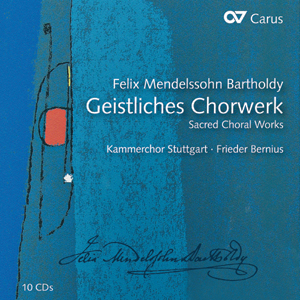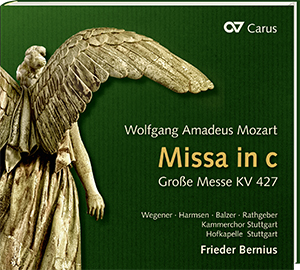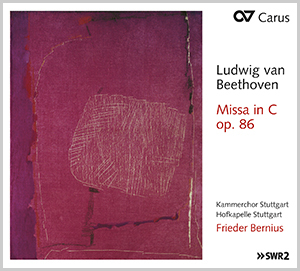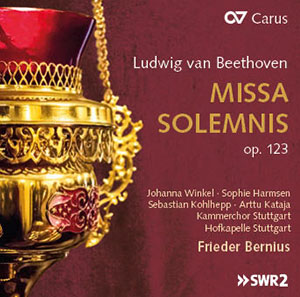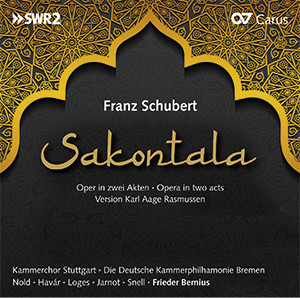
Sakontala
Oper in zwei Akten D 701
A must for Schubert fans and lovers of 19th century opera – Sakontala – an operatic fragment from the pen of Franz Schubert. The composer was deeply involved in 1821/ 1822 with the Indian subject about the hermit’s daughter Sakontala. Schubert’s drafts and sketches survive in autograph for two acts of the opera. Following the rediscovery of the complete libretto in 2001, and the stylistically sensitive and skilled completion of the music by the Danish composer Karl Aage Rasmussen, Frieder Bernius made the first recording of this previously unknown Schubert opera with top soloists, the Kammerchor Stuttgart, and the Deutsche Kammerphilharmonie Bremen. This recording was unavailable for long time, but has now been re-issued by Carus.
Acheter
Informations complémentaires sur l'œuvre
Sommaire
-
Compositeur
Franz Schubert
| 1797-1828Throughout most of his life Franz Schubert was concerned with church music. When he was eleven he was chosen as treble soloist at his local church in the Vienna suburb of Lichtenthal and soon afterwards he was admitted to the choir of the Imperial Court Chapel, directed by Antonio Salieri. Soon he also began to compose; his earliest surviving sacred pieces date from 1812. During his lifetime his church music achieved a comparatively wide degree of acceptance but after his death, most notably, his smaller works were unjustly forgotten. The Carus programme encompasses Schubert’s complete sacred compositions and it is intended to emphasize the wide range of his works in this area. Many of the smaller liturgical compositions are published here for the first time in separate editions. What is to be discovered is a fascinating œuvre, rooted in the ‘stile antico’ of Antonio Salieri and in the compositions of the Viennese classical masters, but whose exquisite lyricism and harmonic subtlety reveal a typically Schubertian world of expression: works with great power of conviction and exceptional musical beauty. Plus d'information sur la personne
-
Arrangeur
Karl Aage Rasmussen
Karl Aage Rasmussen wurde 1947 in Kolding, Dänemark geboren. Seine Ausbildung erhielt er an der Staatlichen Musikakademie in Aarhus, wo er später für mehr als zwei Jahrzehnte als Kompositionsprofessor lehrte. Außer dem Opernprojekt hat sich Rasmussen mit Schubert beschäftigt in seinem Versuch einer Rekonstruktion derjenigen Reste, die seines Erachtens zur Gasteiner-Sinfonie gehören könnten, die im Allgemeinen als verloren gilt, sowie in seiner Orchestrierung von Schuberts großem Schiller-Melodram Der Taucher (im Auftrag des international renommierten dänischen Sängers Bo Skovhus). Rasmussen ist ebenso als Autor von Essays und Büchern hervorgetreten, darunter mit Werken über Robert Schumann, Glenn Gould und kürzlich mit einer umfangreichen Biografie des Pianisten Sviatoslav Richter. Sein letzter Film über Carl Nielsen (The Light and the Darkness) fand viel Beifall und ist nun – in vier Sprachen – als DVD erhältlich. Darüber hinaus war Rasmussen als Programmgestalter für Neue Musik im Dänischen Rundfunk, als Ko-Herausgeber des Danish Music Magazine und als Mitglied des Danish Music Council aktiv; hinzu kommt eine rege Vortragstätigkeit in vielen europäischen Ländern und in den USA. Viele Jahre war er künstlerischer Direktor des bedeutenden NUMUS-Festivals. Seine Musik umfasst Werke in vielen Genres, einschließlich der Oper, und wurde in mehr als dreißig Ländern aufgeführt. Er lebt in Dänemark und Rom. 1991 erhielt er den Carl-Nielsen-Preis und 1997 den Wilhelm-Hansen-Komponisten-Preis. Plus d'information sur la personne
-
L'auteur de l'avant-propos
Karl Aage Rasmussen
Karl Aage Rasmussen wurde 1947 in Kolding, Dänemark geboren. Seine Ausbildung erhielt er an der Staatlichen Musikakademie in Aarhus, wo er später für mehr als zwei Jahrzehnte als Kompositionsprofessor lehrte. Außer dem Opernprojekt hat sich Rasmussen mit Schubert beschäftigt in seinem Versuch einer Rekonstruktion derjenigen Reste, die seines Erachtens zur Gasteiner-Sinfonie gehören könnten, die im Allgemeinen als verloren gilt, sowie in seiner Orchestrierung von Schuberts großem Schiller-Melodram Der Taucher (im Auftrag des international renommierten dänischen Sängers Bo Skovhus). Rasmussen ist ebenso als Autor von Essays und Büchern hervorgetreten, darunter mit Werken über Robert Schumann, Glenn Gould und kürzlich mit einer umfangreichen Biografie des Pianisten Sviatoslav Richter. Sein letzter Film über Carl Nielsen (The Light and the Darkness) fand viel Beifall und ist nun – in vier Sprachen – als DVD erhältlich. Darüber hinaus war Rasmussen als Programmgestalter für Neue Musik im Dänischen Rundfunk, als Ko-Herausgeber des Danish Music Magazine und als Mitglied des Danish Music Council aktiv; hinzu kommt eine rege Vortragstätigkeit in vielen europäischen Ländern und in den USA. Viele Jahre war er künstlerischer Direktor des bedeutenden NUMUS-Festivals. Seine Musik umfasst Werke in vielen Genres, einschließlich der Oper, und wurde in mehr als dreißig Ländern aufgeführt. Er lebt in Dänemark und Rom. 1991 erhielt er den Carl-Nielsen-Preis und 1997 den Wilhelm-Hansen-Komponisten-Preis. Plus d'information sur la personne
-
Chœur
Kammerchor Stuttgart
The Kammerchor Stuttgart is regarded as one of the best ensembles of its kind. Over its fifty-year existence, Frieder Bernius has developed the choir into an exceptional ensemble acclaimed by audiences and press alike. This has led to invitations for the choir to perform at all the important European festivals. In Germany the chamber choir performs at festivals and in concert halls in repertoire ranging from the 17th to the 21st century. Frieder Bernius and his ensemble have received numerous accolades for their contribution to new music. The Kammerchor Stuttgart has made over 80 CDs and LPs, numerous of which have been awarded international recording prizes (including the Edison award, Diapason d’or, Gramophone Choice, Classical Internet Award, International Classical Music Award, and German Record Critics’ Award prizes). The International Federation for Choral Music has invited the ensemble to sing at the 1st, 4th and 10th World Symposia on Choral Music in Vienna, Sydney and Seoul. Regular tours of North America and Asia since 1988 and a South America tour reflect the Kammerchor Stuttgart’s international reputation. Since 1984 the top ensemble has also been invited to Israel biennially. Plus d'information sur la personne
-
Orchestre
Die Deutsche Kammerphilharmonie Bremen
The Deutsche Kammerphilharmonie Bremen is one of the world's leading orchestras, captivating audiences everywhere with its unique style of music-making. The Estonian conductor Paavo Järvi has been the orchestra's Artistic Director since 2004.
One of the many highlights of the collaboration with Paavo Järvi has been their Beethoven Project, on which conductor and orchestra concentrated for six years. Their Beethoven interpretations have been acclaimed worldwide by audiences and critics alike as benchmark performances. Following the Beethoven Project The Deutsche Kammerphilharmonie Bremen and Paavo Järvi focused on Robert Schumann's symphonic works with equal success.
The latest project of the orchestra and its conductor is the German composer Johannes Brahms. The first CD (Sony/RCA) of the project – Symphony No. 2, Tragic Ouverture and the Academic Festi-val Ouverture – was released in autumn 2017 and received the Opus Klassik in October 2018. The second CD, including Symphony No. 1 and the Haydn-Variations, followed in autumn 2018. With the third and fourth Symphony, released in March 2019, the symphony cycle has come to completion.
Highlight of the project was the internationally acclaimed performance of ›A German Requiem‹ on the 10th of April 2018 at Bremen Cathedral, 150 years after the first performance. The recording has now been released on DVD and Blu-ray by C-Major. In October 2019, ›The Brahms Code‹ – an excit-ing TV/DVD documentary about the Brahms Project produced by Deutsche Welle/Unitel – was re-leased and is the current German Record Critics' Award winner in the category music film (listed 1/20).
The Deutsche Kammerphilharmonie Bremen has been honoured with countless prizes such as Echo, Opus and Diapason d'Or for its recordings and the unique education project with the Gesamtschule Bremen-Ost in Osterholz-Tenever, the Zukunftslabor. For years, the orchestra has cultivated close musical friendships with international soloists such as Christian Tetzlaff, Maria João Pires, Janine Jansen, Igor Levit, Hilary Hahn and Martin Grubinger.
The Deutsche Kammerphilharmonie Bremen is permanent guest orchestra at the Elbphilharmonie Hamburg and Festival Orchestra of Kissinger Sommer. Plus d'information sur la personne
-
Chef d'orchestre
Frieder Bernius
| 1947Frieder Bernius’s work has earned great worldwide recognition. He is in demand internationally as a conductor and as a teacher. His principal artistic collaborators are the ensembles he founded himself, the Kammerchor Stuttgart, the Barockorchester Stuttgart, the Hofkapelle Stuttgart and the Klassische Philharmonie Stuttgart. As a guest conductor, he has collaborated repeatedly with, for example, the SWR Vokalensemble Stuttgart, the Deutsche Kammerphilharmonie Bremen, the Stuttgarter Kammerorchester and the Streicherakademie Bozen. Great stylistic versatility is Frieder Bernius’s hallmark. Whether he conducts vocal works by Monteverdi, Bach, Händel, Mozart, Beethoven, Fauré and Ligeti, stage music by Mendelssohn or symphonies by Haydn, Burgmüller and Schubert, his work always aims for a sound that is at once unmistakably personal and at the same time oriented towards the original period sound ideal. He devotes himself equally to the rediscovery of 18th century operas and to first performances of contemporary compositions. He is particularly interested in the musical history of southwestern Germany. Carus-Verlag has awarded Frieder Bernius a Golden CD for his complete recording of the sacred music of Felix Mendelssohn Bartholdy. The award was presented to him during the German Choir Festival in Stuttgart 2016. The sale of over 250,000 recordings, which has been acclaimed with a number of awards, has made a not insignificant contribution to what today is the obvious presence of Mendelssohn's complete œuvre in the concert repertoire. Plus d'information sur la personne
-
Solist - soprano
Simone Nold
Simone Nold étudia à la Musikhochschule (École supérieure de musique) de Munich et suivit les classes de lied de Helmut Deutsch et Dietrich Fischer-Dieskau. Depuis 1996, elle est membre de l'Opéra Unter den Linden de Berlin où on put notamment l'entendre dans les rôles de Pamina, Konstanze, Ännchen et Madeleine. Son vaste répertoire de scène s'étend des œuvres baroques à la musique contemporaine. En plus du lied et de la musique de chambre, le répertoire de concert de Simone Nold comprend les grands oratorios et messes. Elle se produisit notamment avec des chefs comme Pierre Boulez, Adam Fischer, Peter Schreier, Frieder Bernius, Philippe Herreweghe et Christoph Eschenbach. À cette occasion, elle fut invitée dans les grands centres musicaux d'Europe et d'Amérique du Nord et participa à de nombreuses émissions radiophoniques et télévisées. Plus d'information sur la personne
-
Solist - ténor
Dónat Havár
Donát Havár termina ses études de chant avec mention à la Musikhochschule (École supérieure de musique) de Stuttgart en 2004. Il étudia ensuite au Conservatorio Giuseppe Verdi de Milan. En qualité de membre de l'ensemble de l'Opéra de Bonn, il chanta les rôles de Tamino, Don Ottavio, Lysander dans A Midsummer Night's Dream de Britten et le Jephtha de Händel. Il chanta le rôle de Melito dans Der Geduldige Sokrates (La patience de Socrate) de Telemann sous la direction de René Jacobs à la Staatsoper de Berlin. En 2006, il débuta à la Scala de Milan comme Aceste dans Ascanio in Alba de Mozart sous la direction de Giovanni Antonini. On put l'entendre dans le rôle de Ferrando dans Così fan tutte au Concertgebouw d'Amsterdam. D'autres invitations le menèrent à l'Opéra National du Rhin, à la Komische Oper (Opéra comique) de Berlin, à l'Opéra National de Bordeaux et au Festival Rossini à Bad Wildbad. De plus, Donát Havár compte parmi les chanteurs de concert les plus demandés de sa spécialité. Plus d'information sur la personne
-
Solist - basse
Martin Snell
Martin Snell, basse, termina ses études au Royal Northern College of Music de Manchester avec mention en 1994. Il gagna le premier prix lors de nombreux concours de chant. Après ses premières expériences en tant que membre du Opernstudio de l'Opéra de Zurich, les engagements se succédèrent au Stadttheater St. Gallen, à l'Opéra de Bâle et de Lucerne. Depuis, il fut invité notamment au Grand Théâtre de Genève et à l'Opéra Unter den Linden de Berlin, ainsi qu’au Festival de Bayreuth où on put dernièrement le voir dans le rôle de Hermann Ortel dans la mise en scène de Katharina Wagner des Meistersinger von Nürnberg. Le répertoire du chanteur comprend des rôles de Monteverdi et Händel jusqu’à Gounod, Janácek, Verdi et Wagner, en passant par Mozart et Rossini. Plus d'information sur la personne
-
Solist - basse
Konrad Jarnot
Surtout depuis son 1er prix au concours de musique de la ARD (chaîne de télévision allemande) à Munich en 2000, Konrad Jarnot se produit dans toutes les salles de concert internationales importantes, notamment au Lincoln Center de New York, au Concertgebouw d'Amsterdam, au Wigmore Hall de Londres et à la Tonhalle de Zurich. À cette occasion, en ce qui concerne l'opéra et les concerts, il travaille régulièrement avec des chefs comme Riccardo Chailly, Philippe Herreweghe, Frieder Bernius et Peter Schreier ainsi que notamment avec le Israel Philharmonic Orchestra, le Gewandhausorchester de Leipzig et l'Orchestre National de France. De nombreuses productions radiophoniques et télévisées ainsi que des enregistrements de CD, récompensés notamment par le Prix de la critique discographique allemande et le Diapason d'Or, attestent de son œuvre artistique. Plus d'information sur la personne
-
Solist - basse
Stephan Loges
Stephan Loges commença sa formation musicale au Dresdner Kreuzchor, avant d'étudier le chant à Berlin et Londres. Grâce à ses riches expériences dans le répertoire des oratorios et opéras, il compte désormais parmi les chanteurs les plus demandés de sa génération. De nombreux premiers prix lors de concours de chant internationaux attestent de son haut niveau artistique. Ses récitals de Lieder l'ont mené notamment au Wigmore Hall de Londres, au Carnegie Hall de New York et au Festival de musique du Schleswig-Holstein. Il est engagé régulièrement par des chefs célèbres pour des concerts et se produit avec des orchestres comme le San Francisco Symphony Orchestra, le Orchestra of the Age of Enlightenment ou le Gabrieli Consort. Plus d'information sur la personne
Questions fréquentes sur l'œuvre
 Il n'y a pas encore de questions et réponses concernant cette œuvre ou vous n'avez pas trouvé la réponse à votre question sur l'œuvre ? Cliquez ici et envoyez votre question spécifique à notre service clients.
Il n'y a pas encore de questions et réponses concernant cette œuvre ou vous n'avez pas trouvé la réponse à votre question sur l'œuvre ? Cliquez ici et envoyez votre question spécifique à notre service clients.



